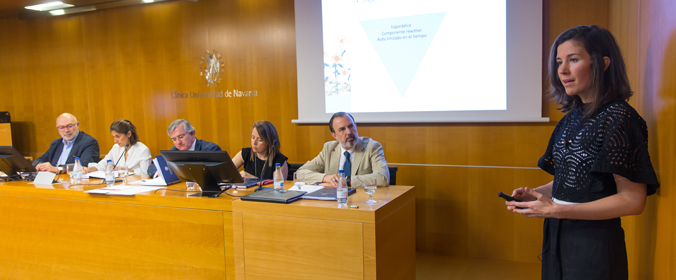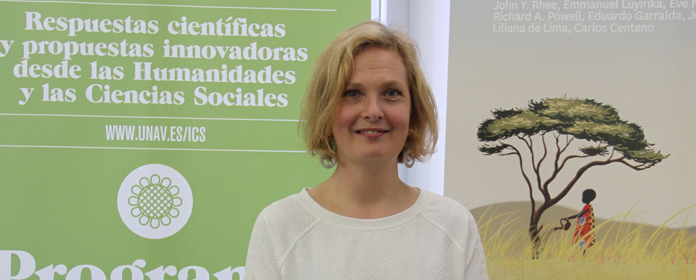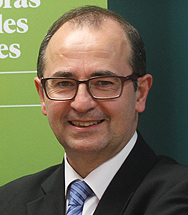Alazne Belar defends her thesis on experiences of "wanting to die" in patients with advanced disease.
Belar has made his research in the framework of the ATLANTES program of the Institute for Culture and Society

PHOTO: Manuel Castells
Alazne Belar, doctoral student of the ATLANTES Program of the Institute for Culture and Society (ICS) of the University of Navarra, has defended her doctoral thesis entitled 'The experience of wanting to die in patients with advanced disease: a study of prevalence and associated factors in a Spanish population', which she has developed in the framework of the doctoral program of Applied Medicine and Biomedicine.
Its research has consisted of a quantitative analysis of data obtained through interviews with 200 patients from the Clínica Universidad de Navarra and the Palliative Care Unit of the Hospital San Juan de Dios of Pamplona.
Eleven percent of the participants in the research sporadically expressed 'wanting to die' at some point in their illness; in 7%, these experiences were more persistent and 1% considered bringing their death forward. In view of this, Belar assures that "thepatient should never be judged; all these experiences are valid and reflect their suffering".
In addition, he believes that these expressions open a door of exploration and understanding for the patient and can be a starting point for talking with them about the end of life and death. "We have seen," he notes, "that talking about these issues does not hurt them and they have appreciated having the opportunity to express what they feel without being judged.
Belar considers it essential to delve into the experience of each patient because "there is a range of experiences and it is not convenient to talk about them without taking into account the nuances that each expression entails". He explains that it is a dynamic experience, where there can be more than one feeling -such as wanting to live and wanting to die- and that they can fluctuate over time.
According to him, these feelings can be due to many factors, such as symptoms or existential, psychological, social and personal aspects, which can be addressed.
Patient accompanimentIn this sense, the new doctor stresses the importance of listening to and understanding the patient, since these expressions have different meanings. Some of the patients who express a 'wish to die' sometimes "what they mean is that they cannot go on any longer, that they need financial aid, that they want to live but in a different, better way; for example, without pain," she points out.
He points out that the first thing to do is to identify and recognize the patient's experience. He warns that, "if the patient's experience is not understood in depth, an inadequate diagnosis or treatment may be given, resulting in suboptimal care for that person".
Once detected status, he insists that healthcare professionals should talk to the patient without judgment, build empathy and trust, and provide the necessary care.
"We have seen that talking about these issues does not hurt them and they have appreciated having the opportunity to express what they feel without being judged." Precisely, it has been seen that it does not worsen their level of depression or anxiety.
The researcher stresses the importance of delving into the patient's experience in order to be able to offer comprehensive care. She also recalls that "the way in which the patient is accompanied can influence the way in which he or she experiences the disease".
In the framework of his doctoral thesis , Belar made a research stay at the University Hospital Center of Vaud (CHUV) in Lausanne (Switzerland) thanks to a predoctoral financial aid of mobility international offered by the Government of Navarra. There she was able to compare her data and devise new hypotheses under the guidance of Philip Larkin, Full Professor of palliative care at the University of Lausanne and director academic of high school of Education and research of Care of the same center.
After the defense of the doctoral thesis , Belar will continue with this research in the ICS as part of the work of research 'Dignity and wishes to die in patients with advanced disease: study of the associated factors and the experiences of patients and professionals'. This research is carried out by the ATLANTES Program thanks to a scholarship of the high school de Salud Carlos III, dependent on the Ministry of Science, Innovation and Universities.




